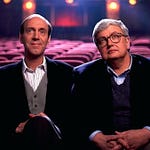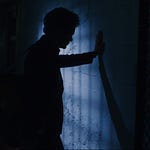On today’s show, we thought we’d invite you to what may be your first day of camp—but not the Wet Hot American Summer variety. We’re talking about the kind of camp that Susan Sontag described as blurring the line between high and low culture in its appreciation of artifice, exaggeration, and stylization. This is the sort of thing that often gets called so bad it’s good, embracing the silly and over the top in place of obviously recognizable emotion.
This is murky territory, especially in a time when genres are often very clearly delineated and follow recognizable conventions. It’s often not difficult to decide whether a movie is in on a joke—or if the movie is operating with jokes at all. But one movie stood out last year for sparking a debate often on the grounds of its categorization as much as its thorny subject matter: Todd Haynes’s May December.
As its trailer suggests, May December is a story about unethical behavior as it manifests in a few dimensions. You have Elizabeth, played by Natalie Portman, as an actress looking to find authenticity in her new role playing a dramatized version of the life story of Gracie and Joe, played by Julianne Moore and Charles Melton. Their life story is itself a dramatization of the Mary Kay Letourneau scandal, in which then-adult Letourneau had an illegal affair with one of her twelve-year-old students. May December, written by Sammy Burch as something inspired by but not beholden to the Mary Kay Letourneau story, imagines them decades after the incident blew up their lives.
Still together, Gracie and Joe are about to become empty nesters as their children graduate high school and they are left to face the life they’ve lived together—provoked by Elizabeth’s attempt to understand them as the subject of her new film. Much of the movie exists in a space of discomfort and unethical decision making, something made even thornier in its employment of a real life scandal as the basis for the story. Is it ethical to use a real life crime as the inspiration for a film that seems, at times, to be poking fun at the idea of its characters and the way their traumas manifest? All of this has been further complicated by a persistent debate over tone and genre: would a more reverent tone help? Is the movie laughing at these people? If it laughs at these people, are you unethical for laughing at them, too?
These are difficult questions to answer because they manifest in several perspectives, from filmmaker to cast to characters to critics and audiences. To try to understand what to do with May December, both on its own terms and as part of broader trends in media literacy, we turned to perhaps the real experts on media today: YouTube personalities. We hear from Izzy Custodio from the channel Be Kind Rewind about the ethical considerations of Todd Haynes’s new movie and storytelling in general. And later in the show, Maia Wyman from the channel Broey Deschanel discusses the implications of the camp debate over May December for our culture’s media literacy at large.
You may also want to check out each guest’s video essays on May December and the themes of this episode—Custodio’s The Collaborations of Julianne Moore and Todd Haynes: Masters of Genre and Wyman’s May December and the Melodrama of Film Twitter.
The Entertainment is a production of KIOS 91.5 FM Omaha Public Radio. It is produced and edited by Courtney Bierman. Our artwork was created by Topher Booth. Today’s show featured music and clips from May December, Wet Hot American Summer, Miller’s Crossing, and Darkman.














10. First Day of Camp